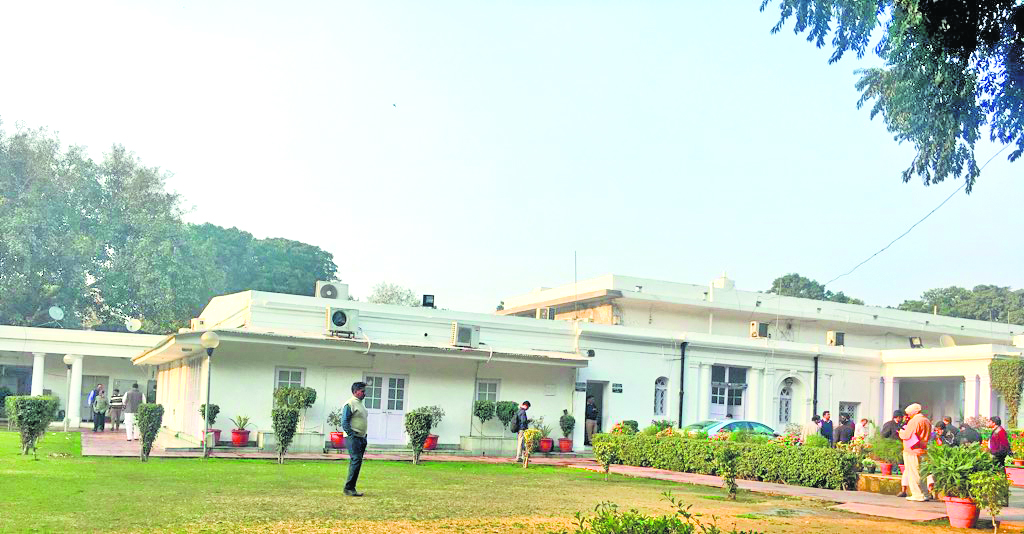


It has been nearly 45 years that 24, Akbar Road has served as headquarters of the Indian National Congress. With three days to go for a new decade, the grand old party is all set to shift out of 24, Akbar anytime early next year to Indira Bhawan at the Deen Dayal Upadhyay Marg, where rival BJP already has an impressive, sprawling new headquarters.
On the 139th foundation day of the Congress, here is a quick recap of how the Congress under Indira had occupied 24, Akbar Road, witnessing many highs and lows, rise and fall.
It was a chilly winter morning in January 1978 when Shoban Singh and twenty other karamcharis (workers) of the breakaway Congress headed by former Indian prime minister Indira Gandhi entered 24 Akbar Road. A Type VII bungalow in Lutyens’ New Delhi, 24 Akbar Road belonged to G. Venkatswamy, a Rajya Sabha Congress member of parliament (MP) from Andhra. Venkatswamy had chosen to side with Indira Gandhi when most Congress leaders had stayed away, fearing that proximity to her would invite retaliation from the ruling Janata Party.
It was a testing time for Indira and her party. She was herself ‘homeless’. Her Mehrauli farmhouse was half-built and she was losing friends fast. Even trusted friends such as Teji Bachchan (Hindi film actor Amitabh Bachchan’s mother) had begun complaining that the government run Censor Board was troubling her son and producer Manmohan Desai, who had made many blockbusters starring Amitabh. Family loyalist Mohammad Yunus offered his residence, 12 Wellington Crescent, for Indira and her family as their private residence, while he moved to private quarters in South Delhi.
Incidentally, this was not 24 Akbar Road’s first brush with history. For two years beginning 1961, it played host to Aung San Suu Kyi, Myanmar leader. Suu Kyi was barely fifteen when she arrived at 24 Akbar Road with her mother, Daw Khin Kyi, Aung San’s widow, who was appointed Myanmar’s ambassador to India.
24 Akbar Road was named Burma House by Jawaharlal Nehru in recognition of Daw Khin Kyi’s special status. The house built by Sir Edwin Lutyens between 1911 and 1925 was regarded as a singularly fine example of British colonial architecture and a masterpiece of early Modernism.At another level, 24 Akbar Road ‘reunited’ the Nehru-Gandhi links to the Mughals, even if only through a road named after the greatest Mughal emperor. The Nehrus were initially Kauls of Kashmir, who were invited to Delhi in 1716 by the Mughal king, Farrukh Siyar, who had a sense of scholarship and was known to house poets and men of letters in his grand durbar.
After the 1969 split, Indira’s breakaway Congress emerged as the ‘real Congress’ and she had no regrets in splitting the party over her choice of presidential nominee V.V. Giri against the old guard’s choice of Neelam Sanjiva Reddy. The Congress split of 1969 was significant on many counts. As a result of the split, Indira’s Congress lost control over 7 Jantar Mantar Road, where the party office had been housed since independence. It moved first to 5 Rajendra Prasad Road in 1971 and then to 24 Akbar Road in 1978.
The bitter split of 1978 left the Indira Congress with absolutely nothing. The then office secretary, Saddiq Ali, had declined to hand over any official records, papers or books to Indira. So, the party no longer had any files, old records, correspondence, office stationery, flags or typewriters. Indira was greatly pained to lose her party’s invaluable archives, but when she returned to power with a thumping majority in 1980, like a true believer in destiny, she refused to stake claim on old party office. ‘I have built the party from scratch, not once, but twice. The new office premises will rejuvenate the party rank and file for decades,’ she told Sanjay, when her politician son broached the subject of returning to the old party office.
Indira’s words proved prophetic. 24 Akbar Road provided a new lease of life to the Congress. Like the Mughal emperor, Akbar, after whom the road on which it stands is named, 24 Akbar Road struggled and faltered in its nascent stages, but managed to stand on its feet in such a manner that it provided strength and stability for decades to come.
Even in 2009 when the Congress was heading the UPA government at the centre, none of the AICC general secretaries occupying the big rooms at 24 Akbar Road, except Rahul Gandhi, had won a parliamentary election. For decades, 24 Akbar Road, has contributed little in terms of generating new ideas and issues into the party’s programmatic agenda. These ‘non-accountable’ leaders often lacked the ideological clarity of which the Congress was so proud and they were unable to come up with any out of the box ideas. These functionaries act more to kill or blunt any fresh initiative, rather than putting in processes whereby the party could make collective use of the talent it had at its command.
A new office and new leader in Mallikarjun Kharge have a daunting task cut out for them.
Would the grand old party live to stand on its feet at Indira Bhawan, Deen Dayal Upadhyay Marg from January 14, 2024 onwards or go down in history as a party that was crushed by the might of Narendra Modi.

(Rasheed Kidwai is an Indian journalist, author and political analyst.)